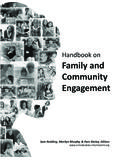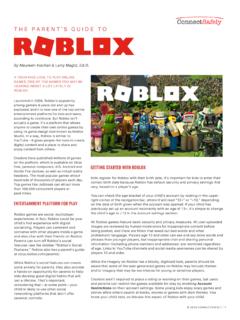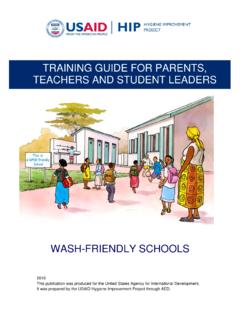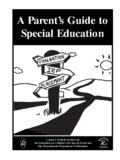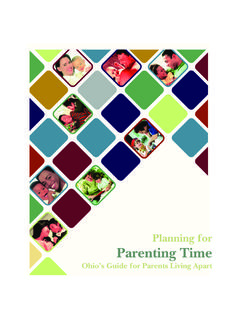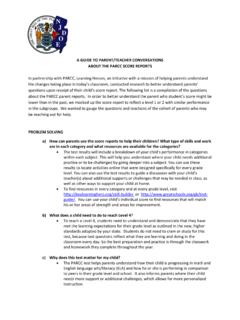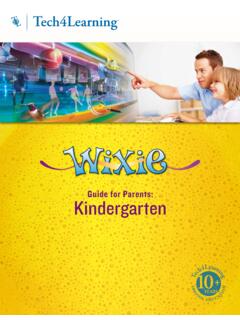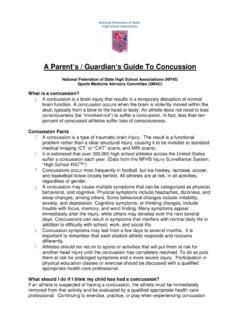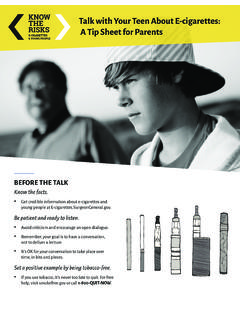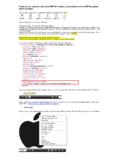Transcription of A Guide for Parents - School Community Network
1 A Guide for Parents : Helping Your Child Succeed in School A Guide to help you understand: No Child Left Behind State Learning Standards Parent Practices to Help Children Learn Parent/ School Relationships A Notes about the Guide : ll Parents want their children to succeed in School . This Guide is designed to give Parents , grandparents, and other caregivers ideas and tips that will improve their children's potential for success in School . These ideas also help create a joyful Tips you can use are marked with a purple check family life and positive connections between Parents mark in a green box. and children, Parents and Parents , and Parents and their children's schools.
2 Solid research shows that children from homes where Parents are engaged with their children, other Parents , and their children's schools: Questions you can ask to learn more from those Earn better grades, around you are marked with a red question mark Get better test scores, in a yellow box. Enjoy School more, and Are more likely to graduate from high School and attend college. Use the Help*Check*Praise Method This Guide will help you understand state learning Help*Check*Praise is a method Parents use to standards, the benefits provided by No Child Left develop habits and skills in their children. First, Behind, and what you can do to help your child suc- you HELP your child, by having the child do ceed in School .
3 The desired action with your help. Then, you CHECK to make sure your child continues to do the task well. If he or she has trouble, more HELP may be needed. PRAISE is the final step in developing a good habit. Encourage the child to keep up the good work by giving PRAISE for a job well done. About ADI. The Academic Development Institute (ADI) works with families, schools, and communities so that all children may become self directed learners, avid readers, and responsible research publishing training citizens, respecting themselves and those around them. 121 N. Kickapoo St., Lincoln, IL 62656. ADI's vision is of an American landscape filled with distinct School communities reflecting the hopes and dreams of the people intimately attached to them.
4 To learn more about the work of ADI, please visit our website: Learn more about No Child Left Behind at Note: Download copies of this Guide from 2006 The Academic Development Institute Academic Development Institute Part 1: State Standards and NCLB. T he state learning standards are statements which define a core of basic knowledge and skills that all students enrolled in public schools are expected to know and be able to do. The schools use these standards as a guideline for teaching and testing. The standards are a way to help all the students in the state have fair, equal opportunities to learn. A state learning standards framework sets basic Guide - lines for what students should know and be able to do in areas such as English/language arts, mathematics, sci- ence, social science, physical development and health, fine arts, and foreign languages.
5 Local School boards can add their own goals and standards for their schools. Tips for helping your child meet your state's learning standards are included in Part 2 of this Guide . If you would like a copy of your state's learning standards, you can find them at public schools and public libraries or through your state's department of education. What is No Child Left Behind? N o Child Left Behind is the federal education plan for public schools. It is designed to improve student learning and help schools do a bet- ter job of teaching. The law includes several important opportunities for Parents to be involved with the schools.
6 A School or district can receive Title I funds if a certain percentage of its students are from low-income families. Every School district that receives federal Title I funds must have a Title I parent involvement policy that Parents help to write and approve. This policy must be evaluated every year; it must explain how the district will involve Parents in decision-mak- ing. Tips on becoming more involved in this process at your School are provided in Part 2 of this Guide . Title I schools that do not meet state standards are said to be in need of improvement. Parents of students in these schools have special rights and responsibilities, which are discussed in Part 3 of this Guide .
7 Part 2: Parent Practices Good News for Parents to Help Children Learn Below are things Parents know, do, or expect that help their child learn and become successful in School : R esearch studies have shown that every parent can help their child do well in School . You don't have to understand trigonometry or buy anything special. A. Parent/Child Relationship Your parenting practices and the relationship you build with your child's School will help your child succeed. 1. Daily conversation about everyday events Following are proven practices that can benefit your Spend a few minutes daily with each child, talk- family, with tips to help you get started, and questions ing and listening with patience and love.
8 To help you find more information along the way. Take time to understand your children's world . their friends, activities, music, etc. 2. Showing affection Show love to your child in many ways, from hugs to praise to special time together. 3. Family discussion of books, newspapers, magazines, and TV programs Talk with your child about what he/she is reading and what you are reading. 4. Family visits to libraries, museums, zoos, etc. Go with your children to places where learning is a family activity. Ask School personnel or other Parents for ideas of free or low-cost places your family could visit together.
9 5. Encouragement to try new words Make a family game out of looking up new words who can find the most new words in the newspaper, or who can guess the correct meaning of a new word heard on TV before you look it up in a dictionary? B. Routine of Family Life 1. Formal study time at home Make daily study time a family value, some- thing each child does with or without homework assignments from School . 2. A daily routine that includes time to eat, sleep, play, work, study, and read Establish a family routine with regular meal- times, bedtimes, homework time, and outdoor play/exercise time. Make sure your child eats healthy, nutritious foods and visits a doctor and dentist regularly.
10 Academic Development Institute 3. A quiet place to study and read C. Family Expectations and Find a spot with good light for a reading/study- Supervision ing area. 4. Family interest in hobbies, games, and 1. Priority given to schoolwork and reading activities of educational value over television and recreation Share family stories and traditions; they give a You don't have to sell your TV, but DO set time sense of meaning and belonging. limits on TV, computer, and phone. Too much Set times for family fun, such as a regular weekly time at a screen takes away from time your child game night. should be spending somewhere else.
